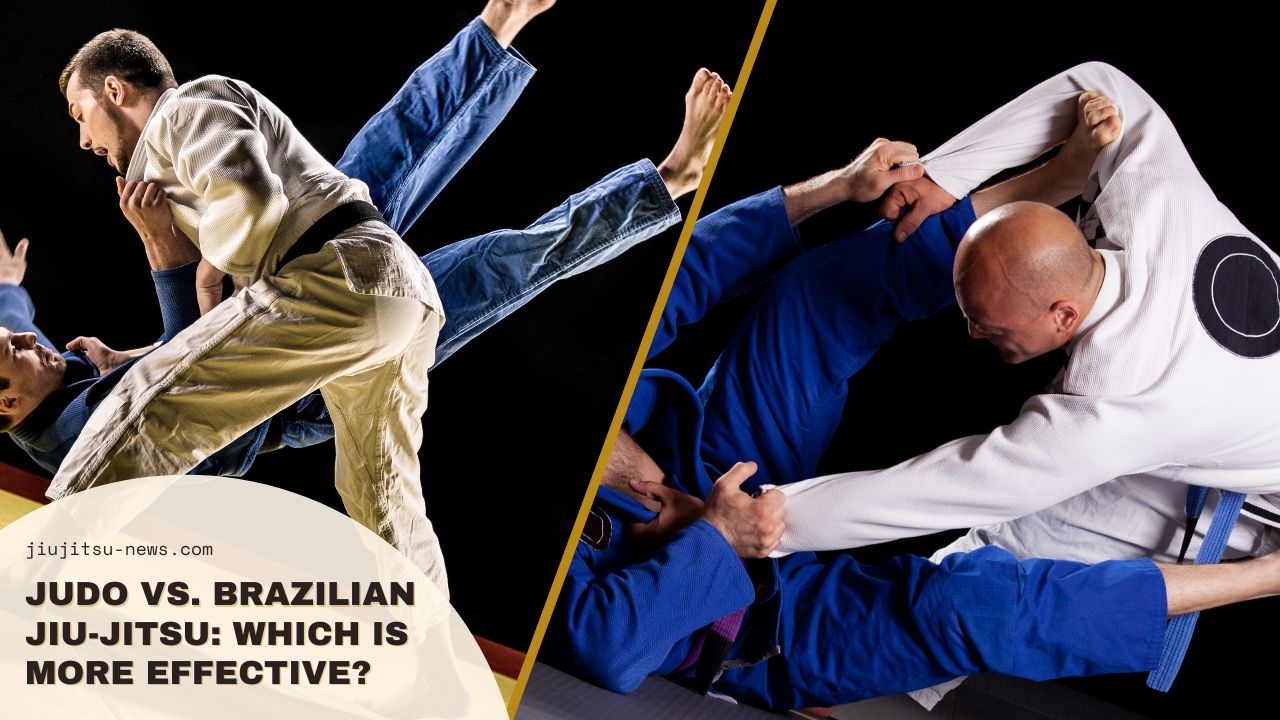
Many people find themselves torn between Judo and Brazilian Jiu-Jitsu when choosing a martial art for self-defense or competition. Each sport offers unique strategies and benefits, making it hard to decide which might be more effective for your personal goals.
In this article, we’ll explore the differences and strengths of Judo and BJJ, helping you understand which martial arts are best for improving your fitness, excelling in competitions, or effectively defending yourself in various scenarios.
- Judo vs Brazilian Jiu-Jitsu: Historical Background and Evolution
- Brazilian Jiu-Jitsu Vs. Judo: Core Techniques and Training Focus
- BJJ Vs. Judo: Scoring and Competition Rules
- Brazilian Jiu-Jitsu Vs. Judo: Self-Defense Effectiveness
- Judo Vs. BJJ: Physical and Mental Benefits
- BJJ Vs. Judo: Accessibility and Learning Curve!
- Judo vs. Brazilian Jiu-Jitsu: Which Is More Effective?
- Conclusion
Judo vs Brazilian Jiu-Jitsu: Historical Background and Evolution
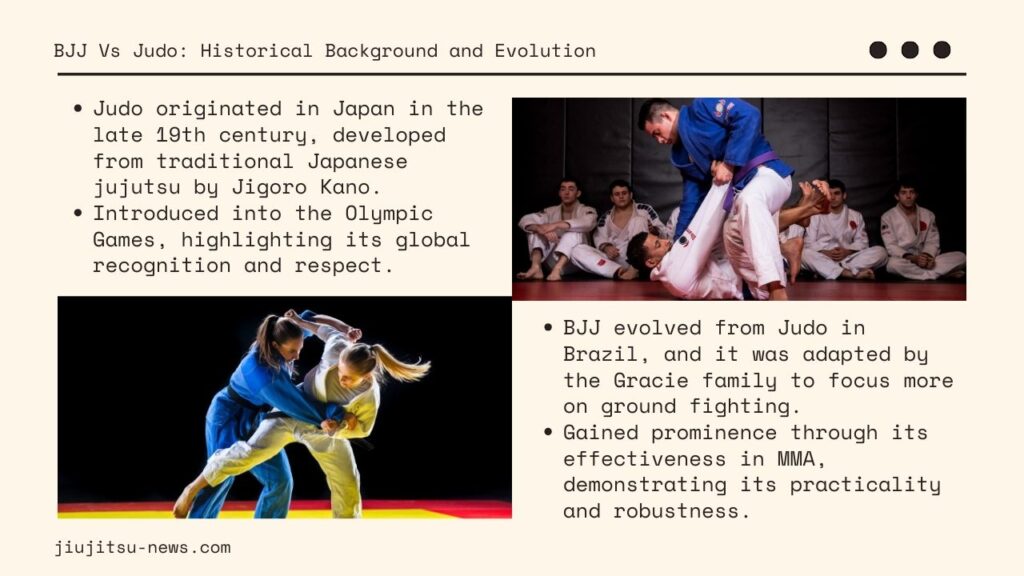
Originating in Japan in the late 19th century, Judo was crafted by the visionary Jigoro Kano.
He transformed traditional Japanese jujutsu into a comprehensive discipline aimed at sporting success, personal development, and moral growth.
Judo was introduced into the Olympic Games as it matured, solidifying its reputation worldwide for its rigorous discipline and distinctive throwing techniques.
Brazilian Jiu-Jitsu evolved directly from Judo but morphed into its distinct form in Brazil, primarily under the influence of the Gracie family.
The Gracies modified traditional Judo techniques to enhance ground fighting, which proved profoundly influential in combat.
This adaptation was pivotal for BJJ, showcasing its practicality and robustness, especially in the burgeoning mixed martial arts (MMA) world.
Brazilian Jiu-Jitsu Vs. Judo: Core Techniques and Training Focus
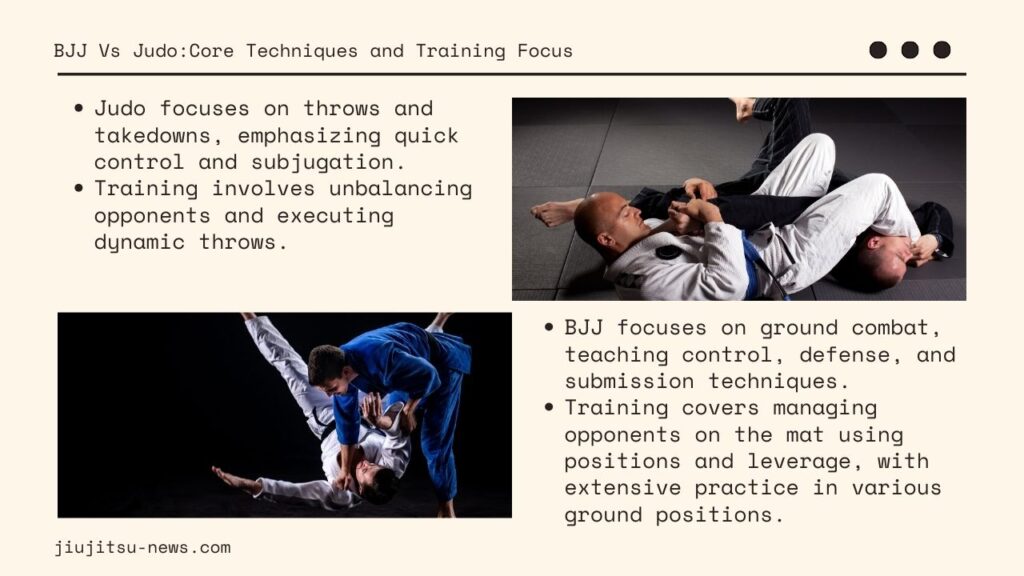
Judo is primarily centered around mastering the art of throws and takedowns, which aim to overpower an opponent from a standing position.
Training in this martial art involves using grips to unbalance opponents, setting them up for dynamic and powerful throws.
This martial art prioritizes swift control and effective subjugation of the opponent, emphasizing speed and efficiency in combat situations.
Brazilian jiu-jitsu focuses on ground combat, where control, defense, and submission are essential.
In BJJ, practitioners learn intricate techniques to manage an opponent on the mat, using positions and leverage to their advantage.
The training extensively covers neutralizing attacks and securing submissions through chokes, joint locks, and holds.
BJJ sessions dedicate considerable time to practicing these techniques across various ground positions, enhancing the fighter’s ability to adapt and apply their skills in real-world scenarios.
BJJ Vs. Judo: Scoring and Competition Rules
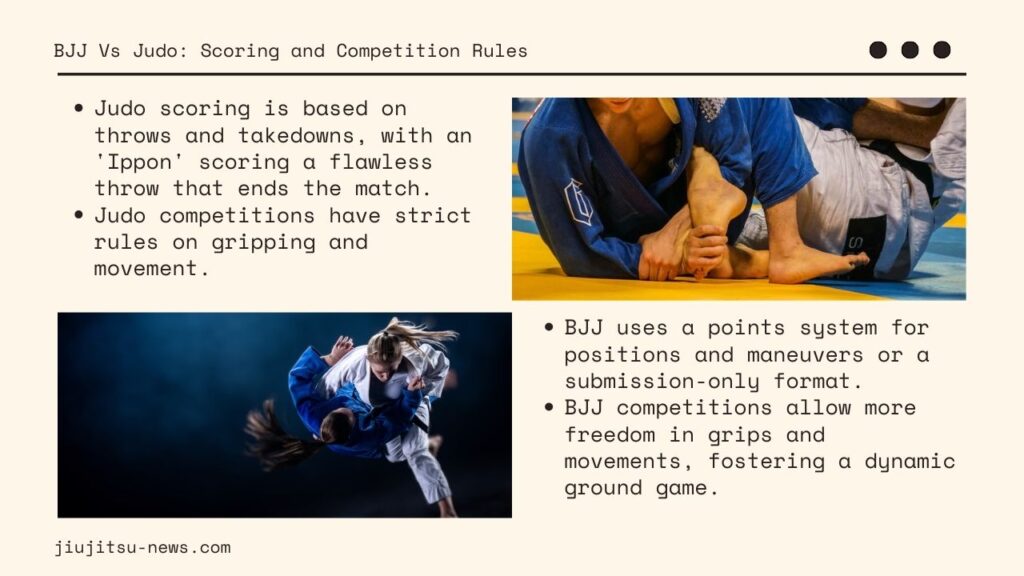
Judo competitions focus on scoring through effective throws and takedowns.
The pinnacle of scoring in Judo is achieving an ‘Ippon’—a flawless throw that immediately concludes the match, demonstrating perfect technique and control.
Additionally, Judo contests are governed by strict rules regarding gripping and movement, which introduces a significant strategic component to the sport.
These rules encourage judokas to think tactically about their approach to combat.
On the other hand, BJJ offers a more varied scoring system, where competitors accumulate points based on achieving and maintaining superior positions, executing successful sweeps, and performing other skilled maneuvers.
Alternatively, some BJJ tournaments are structured around a submission-only format, which continues until one competitor forces the other to submit, highlighting the sport’s emphasis on grappling prowess.
Brazilian jiu-jitsu competitions generally impose fewer restrictions on grips and movements than Judo, allowing for a broader range of grappling techniques and strategies during matches.
This openness fosters a rich, dynamic ground game central to Brazilian Jiu-Jitsu.
Brazilian Jiu-Jitsu Vs. Judo: Self-Defense Effectiveness
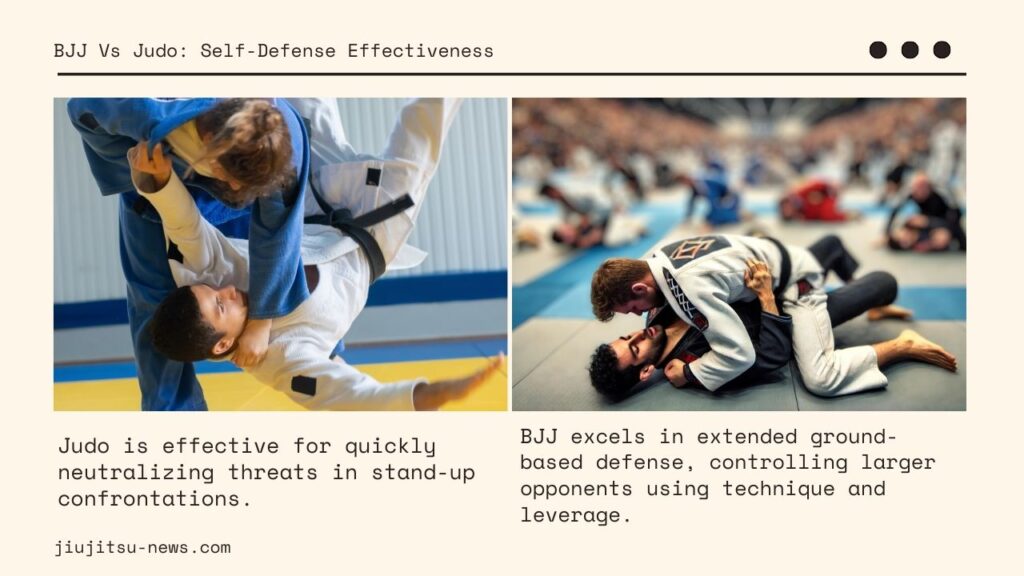
Judo excels in self-defense scenarios that require rapid response to neutralize an aggressor.
The art’s focus on throws provides a powerful tool for quickly subduing an opponent while minimizing harm.
These techniques are particularly effective when both individuals stand, allowing a judoka to leverage their opponent’s momentum against them efficiently and safely.
Brazilian jiu-jitsu is highly effective when a confrontation has moved to the ground.
BJJ’s comprehensive ground techniques enable practitioners to control and subdue opponents significantly more extensively than themselves, relying more on technique and leverage than brute strength.
This aspect of BJJ makes it an indispensable method of self-defense in close-quarters combat, where managing the opponent’s body and movements is crucial.
Judo Vs. BJJ: Physical and Mental Benefits

Judo is renowned for enhancing physical strength, particularly in the legs and core, due to the dynamic nature of its throws. It also cultivates mental acuity, as practitioners must make rapid, strategic decisions during combat.
This combination of physical and psychological training makes Judo a physical challenge and a mental exercise in quick thinking and tactical planning.
Brazilian Jiu-Jitsu boosts flexibility and endurance through prolonged physical engagements typical of ground fighting.
It encourages a systematic approach to combat, demanding patience and intricate planning to set up and execute submissions effectively.
This teaches practitioners physical skills and the mental discipline needed to control and outmaneuver opponents over extended periods.
BJJ Vs. Judo: Accessibility and Learning Curve!
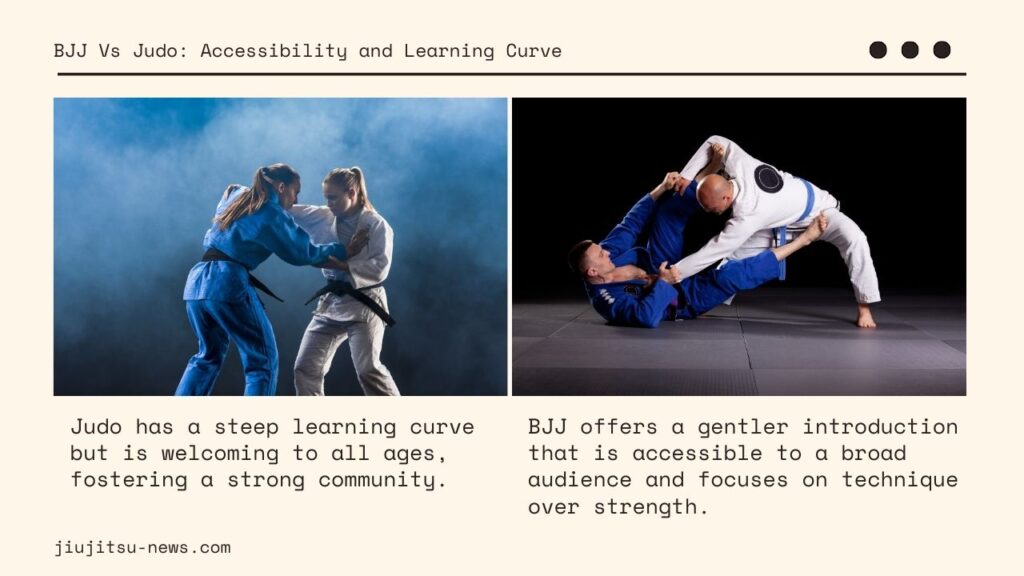
Judo has a steep learning curve due to the technical precision required to master throws.
Nevertheless, it is a welcoming sport for individuals of all ages, offering a strong sense of community within dojos.
The rigorous training fosters a supportive environment where practitioners of different levels can learn and grow together.
Brazilian Jiu-Jitsu offers a gentler introduction to martial arts, making it accessible to a broad audience.
Its emphasis on technique over strength allows individuals of any age and size to participate and progress at their own pace.
This inclusivity is one of BJJ’s key strengths, enabling diverse participants to engage in and benefit from the sport.
Judo vs. Brazilian Jiu-Jitsu: Which Is More Effective?

The effectiveness of Judo and Brazilian Jiu-Jitsu largely hinges on your personal goals and the specific scenarios in which you anticipate using these martial arts.
If your primary objective is to manage and neutralize an opponent using dynamic throws rapidly, Judo is likely your best bet. This martial art focuses on swift, decisive control through standing techniques.
On the other hand, if you value controlling the pace and flow of an engagement with detailed ground-based maneuvers, BJJ may be more aligned with your needs.
Brazilian Jiu-Jitsu specializes in extensive ground work, offering nuanced control and a variety of effective submission techniques in close combat.
Many martial artists opt to train in both Judo and BJJ to utilize each style’s distinct strengths fully. This combined approach allows practitioners to develop well-rounded, adaptable skills for self-defense and competitive situations.
Judo vs. Brazilian Jiu-Jitsu Quiz
Conclusion
Judo and Brazilian Jiu-Jitsu each offer distinct advantages tailored to your fitness goals, self-defense requirements, or competitive ambitions.
Exploring classes in both martial arts can provide invaluable insights, helping you decide which discipline best matches your personal needs and preferences.
By immersing yourself in both communities, you can enrich your martial arts journey and develop a more versatile and comprehensive skill set.
Related: Prove your mastery of Brazilian Jiu-Jitsu with our Ultimate Quiz! Test your knowledge of techniques, famous fighters, and more. Start the challenge now!

